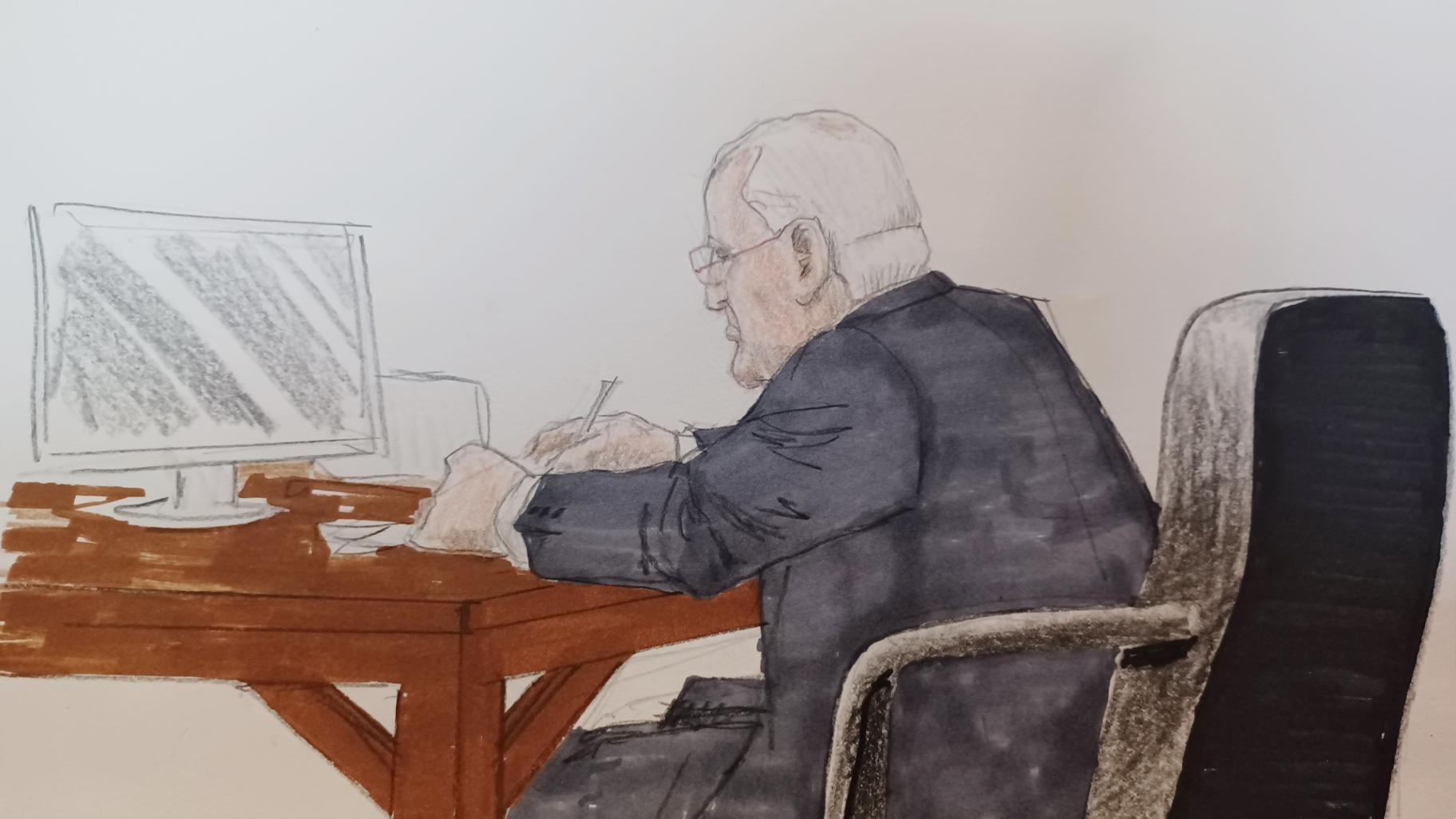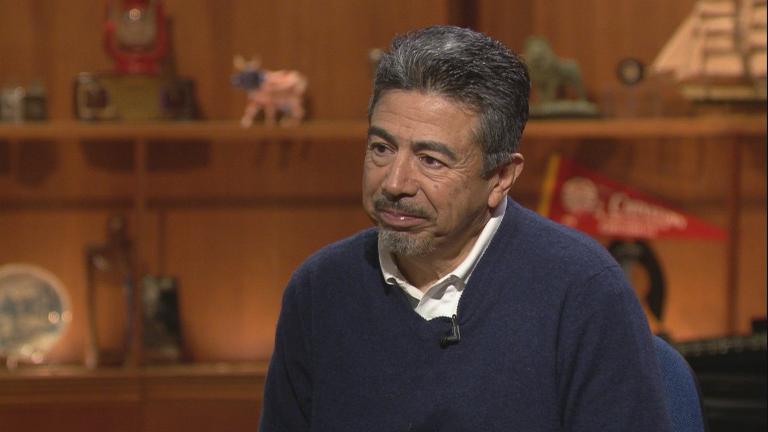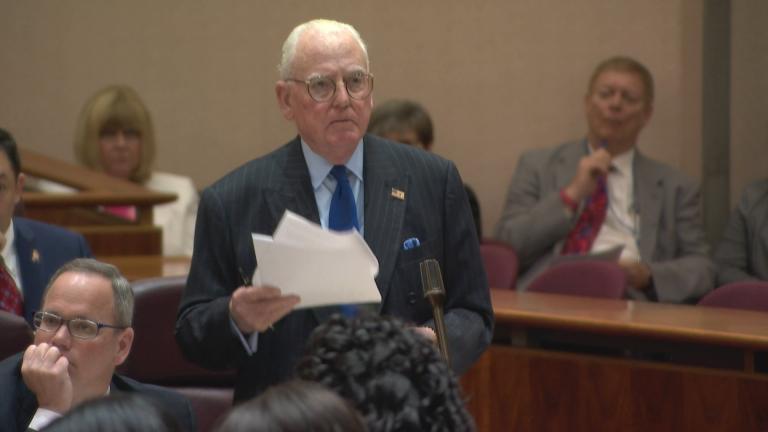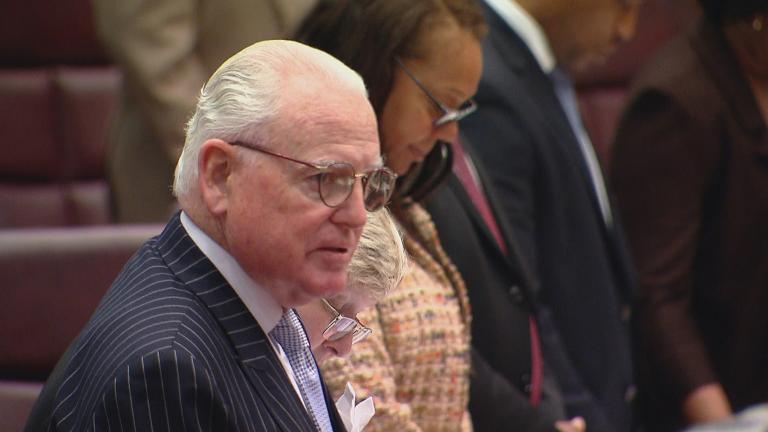 Former Ald. Ed Burke in federal court before U.S. District Court Judge Virginia Kendall on Dec. 5, 2023. (WTTW News)
Former Ald. Ed Burke in federal court before U.S. District Court Judge Virginia Kendall on Dec. 5, 2023. (WTTW News)
One of the last recordings played by prosecutors in the landmark corruption trial of former Ald. Ed Burke didn’t include any of the indelible turns of phrase now enshrined in Chicago’s political corruption hall of shame.
But the June 2017 conversation between Burke and Gery Chico, who once led the Chicago Board of Education, is perhaps more revealing than the former alderperson’s infamous inquiry about whether the tuna has been secured.
Chico tells Burke he wants representatives of construction firm Bully & Andrews, which built a school in Burke’s 14th Ward, to contribute to Burke’s reelection campaign.
“They’re just pretty naive on this stuff, so we’ve had to drag their asses along the way,” Chico said.
Burke did not hesitate before replying.
“Well, maybe if they don’t have any access to the property because their driveway isn’t legal, they might get the message,” Burke said.
Chico, who got his start in Chicago politics as an aide to Burke, laughed.
In 2019, Chico’s close relationship with Burke would help torpedo his second bid for mayor. He did not respond Friday to a request for comment from WTTW News.
The tape of Burke and Chico’s conversation helped prove that the city’s most powerful politician habitually engaged in the kind of classic pay-to-play corruption that has earned Chicago the title of the most corrupt city in the nation four years in a row, as measured by the political science department at the University of Illinois Chicago.
But it is also a stark example of how Burke routinely sought to corruptly leverage his elected office for perks or cash — without anyone around him blowing the whistle or even voicing the mildest objection.
Acting U.S. Attorney Morris Pasqual said after the verdict that Chicagoans deserve better.
“The people have a right to honest and open government where decisions about official actions that public officials take or do not take are based not on their own private, financial interests but on the public interest,” Pasqual said, his voice ringing through the cavernous lobby of the Dirksen U.S. Courthouse.
But Pasqual’s soaring rhetoric faltered, and annoyance seeped into his voice when pressed by WTTW News about why Burke was allowed to operate with impunity for decades.
“In the United States, trials are conducted based on evidence,” Pasqual said. “It is the responsibility of our office, together with federal law enforcement, to accumulate, assemble that evidence and present it to a point where we’re satisfied meets the standard of beyond a reasonable doubt. That’s the process. Speculation about other things that went on and why it couldn’t be done sooner, that’s all a function of what evidence is available to us in a particular investigation.”
Elmhurst University political science professor Constance Mixon said there should be no doubt that Burke was simply caught executing a scheme he fine-tuned over the years until decades of practice made it nearly perfect.
Mixon was the first witness in the federal government’s case against Burke and gave the jury a crash course in Chicago politics, detailing how he was able to use his perch as the chair of the Finance Committee to consolidate power and influence.
In her first extended remarks after Burke was convicted on 13 of 14 counts just before Christmas, Mixon said there will likely never be a full accounting of all of Burke’s crimes — likely complicating efforts to eradicate Chicago’s deeply entrenched culture of political corruption.
That lack of accountability has consequences for all Chicagoans, Mixon said.
“We all pay a price for this corruption,” said Mixon, adding that it has added to the city’s massive debt, poor services and racial disparities.
But Burke, 80, faces a lengthy prison sentence because prosecutors were able to use his own words against him, obtaining a wiretap after then-Ald. Danny Solis agreed to wear a wire and help the FBI probe his friend and colleagues.
Those tapes, including the one that captured his exchange with Chico, turned Burke into the “star witness” against himself, Mixon said.
“This kind of corruption is hard to prove unless you are in the smoke-filled backrooms, where the machine operates,” Mixon said. “Solis took the feds into those rooms.”
Kent Redfield, professor emeritus of political science at the University of Illinois Springfield, agreed with Mixon that the tapes made an “overwhelming” difference in efforts by the public corruption unit of the U.S. Attorney’s Office for the Northern District of Illinois.
The legal case facing Burke was complex, with jury instructions that stretched nearly 300 pages. But the central question facing Chicagoans is rather simple, Redfield said.
“Does the system attract corrupt people or does the system corrupt good people?” Redfield asked, adding that quandary must be resolved before Chicago could ever truly be ready for reform.
There is also a real risk that any appetite for reform will wane in the wake of Burke’s high-profile conviction, as officials pat themselves on the back and celebrate nailing such a high-profile target, Redfield said.
“I wouldn’t downplay for a minute the resilience of the culture of corruption,” Redfield said. “It will be terribly frustrating if we sink back into complacency.”
Whether Burke’s conviction will finally uproot Chicago’s culture of corruption is the “$64,000 question,” Pasqual said, a reference to a 1950s game show that featured contestants answering questions to win a pot of money.
“Alderman Burke obviously joins a long list of corrupt City Council (members),” Pasqual said. “We are determined to continue to investigate these cases using any and all lawful tools at our disposal to ferret out that corruption.”
Burke is the 38th member of the Chicago City Council to be convicted of a crime since 1968.
Pasqual said he hoped Burke’s conviction will serve as a deterrent for other politicians tempted to engage in corruption — and indicated his office is likely to ask U.S. District Court Judge Virginia Kendall to sentence Burke to a lengthy prison term.
Mixon said she wanted to share Pasqual’s optimism.
“I’d like to think it will serve as a deterrent,” Mixon said. “But none of the other 37 convictions served as a deterrent. It ought to make people think twice. But I don’t know. I’d like to be optimistic.”
Contact Heather Cherone: @HeatherCherone | (773) 569-1863 | [email protected]








